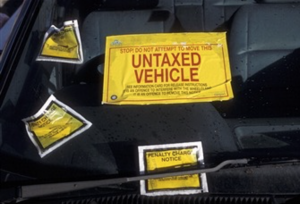It had to happen sooner or later. Stupidly low road tax fees, or indeed total exemption from paying any road tax at all on many new models meant the government had to do something to stem the tide of receding revenue from the beleaguered motorist.
You know what that means. Big changes in the cost of road fund licence (road tax) will see some models in bestselling ranges like the Ford Fiesta, Vauxhall Astra and Nissan Qashqai lose their current exemption from road tax.
From April 1st all new cars will be subject to the new rates. And no, this is not an April  Fools. Many models that are currently exempt will start to attract a larger initial ‘new car’ fee and a minimum £140 a year in road fund license charges, equating to some £400 or so over three years, when a new Treasury scheme comes into place on April 1, affecting any new car registered after that date.
Fools. Many models that are currently exempt will start to attract a larger initial ‘new car’ fee and a minimum £140 a year in road fund license charges, equating to some £400 or so over three years, when a new Treasury scheme comes into place on April 1, affecting any new car registered after that date.
But in the most extreme cases some buyers who choose a car which is currently tax exempt will be charged almost £1,000 over three years.
Buyers of Britain’s cheapest cars will also be targeted by the new system, which will increase tax bills by more than 900% in some cases, compared to the current regime.
Currently, Britain’s cheapest car, a Dacia Sandero, costing £5,995, a buyer will pay nothing in tax for the first year, and £30 every subsequent year.
But the new car tax system will charge owners £160 for the first year and £140 every year after that – a 633% increase.
Some Volkswagen Up owners currently pay just £40 in tax over the first three years. Owners who buy one of those cars after April 1 will pay £420 over the same period – a £950% increase.
The motor trade is already reporting that buyers are changing their cars early to ensure that they are delivered and on the road before April 1st. This will ensure that they are taxed under the current regime until they are scrapped.
Tax Changes
 The current tax scheme is based on carbon dioxide (CO2) emissions. Any car emitting an average of less than 99g of CO2 for every kilometre that it drives is currently exempt from car tax.
The current tax scheme is based on carbon dioxide (CO2) emissions. Any car emitting an average of less than 99g of CO2 for every kilometre that it drives is currently exempt from car tax.
The new rules slash that exemption which, after April 1st, will only apply to vehicles with no CO2 emissions at all – which will be the fully electric only, or hydrogen powered cars.
Drivers of petrol, diesel, or hybrid cars will pay a minimum of £140 in tax each year, apart from the first year that it’s on the road, when tax will still be calculated on CO2 emissions.
It gets worse for anyone buying a car with an official price of more than £40,000.
They will face an annual ‘wealth tax’ for cars between the ages of one and six years. As an example, plucked randomly, a current buyer of a new Land Rover Discovery Sport HSE Black, delivered before April, will pay £390 in tax over three years.
But after April, their bill will rise to £1,100 because the car’s official price is more than £40,000.
The Porsche Panamera 4 E-Hybrid is currently exempt from tax, but from April the bill over three years will climb to £925. Although in all honesty I doubt if a £300 a year price rise will affect many people who can afford a £40,000 plus car, so it is the smaller car buyers that will feel the impact more.
 The changes are expected to earn the Treasury more than a billion pounds a year more from 2020. Car tax revenues had been decreasing, as more fuel efficient cars came onto the market.
The changes are expected to earn the Treasury more than a billion pounds a year more from 2020. Car tax revenues had been decreasing, as more fuel efficient cars came onto the market.
The Treasury finally stepped in when one in five new cars sold in 2015 was efficient enough to be tax exempt, according to the Society of Motor Manufacturers and Traders.
So, now is the time to start looking new car if you want to save money!
Paul Rainbow is Director of vehicle contract hire specialists Troman Finance.
